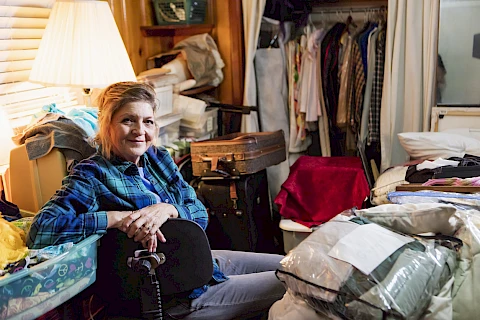
Hoarding is common among seniors, but it's not just a harmless habit of collecting items. For seniors, hoarding can lead to serious risks. Understanding these dangers helps to ensure the health and safety of our loved ones. It's time to highlight the invisible dangers of hoarding and motivate caregivers to take action.
1. Mold and Mildew
Hoarded homes often contain items stacked high and packed tight, creating a perfect environment for mold and mildew to thrive. Piled-up items can block airflow, trapping moisture for long periods. This buildup encourages mold growth, which can be harmful to health. Mold and mildew can cause various health problems, such as coughing, skin irritation, and respiratory issues. Seniors are particularly vulnerable due to weaker immune systems and pre-existing conditions. Look for signs of mold, such as black or green spots on walls or a musty smell.
2. Worsening Air Quality
In homes overwhelmed by hoarded items, air quality becomes a significant concern. Dust accumulates quickly, attracting allergens and pollutants that can make breathing difficult. Poor air quality exacerbates respiratory conditions such as asthma and chronic obstructive pulmonary disease (COPD). You need to keep the air clean for good health, especially for seniors. Using air purifiers and keeping windows open when possible can help, but it all starts with reducing clutter and dust at its source.
3. Fire Hazards
Clutter can be a significant fire risk. Piles of paper, clothing, and other flammable items can ignite quickly, creating dangerous fire hazards. Moreover, blocked exits and overcrowded rooms make it difficult for emergency responders to navigate and assist during a fire. To make homes safer, remove clutter near heat sources like stoves and heaters and create clear pathways. Install smoke detectors and keep fire extinguishers accessible.
4. Trip and Fall Hazards
Cluttered living spaces increase the risk of trips and falls, which can cause severe injuries in seniors. Items on the floor and narrow pathways make movement difficult and unsafe. Falls can lead to broken bones, head injuries, and hospital stays. To prevent this, ensure clear walking paths and remove unnecessary items from floors. Using non-slip mats and grab bars can also help reduce the risk of falls.
5. Pest Infestations
A cluttered home is an attractive environment for pests like rodents and insects. These pests find ample places to nest and food sources among the clutter, leading to infestations. Pests carry various diseases and can contaminate food and surfaces. Signs of an infestation include droppings, chew marks, and strange odors.
6. Social Isolation
Hoarding often leads to social isolation. Seniors may feel embarrassed about their living conditions and avoid inviting friends or family. This isolation can worsen mental health issues like depression and loneliness. Encourage social interaction by setting small, achievable decluttering goals. Support groups and community activities can also provide much-needed social engagement.
Senior Helpers Jacksonville Helps Keep Seniors Safe
Hoarding poses many invisible dangers, such as mold and mildew, poor air quality, fire hazards, trip and fall risks, pest infestations, mental and emotional strain, and social isolation. It's critical to recognize these risks and take steps to create a safer environment for our senior loved ones. If you need help caring for a senior loved one, contact Senior Helpers Jacksonville. We provide professional assistance across Jacksonville and surrounding areas, including Jacksonville Beaches, Arlington, Ft. Caroline, and Yulee.